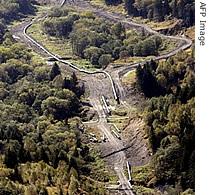2006年VOA标准英语-Large Oil and Gas Project Under Pressure in Rus(在线收听)
By Bill Gasperini
Sakhalin, Russia
20 October 2006
A giant energy project on Russia's remote Sakhalin Island has recently come under scrutiny because of environmental concerns. A foreign run consortium has long been building parallel gas and oil pipelines on the Pacific coast island, but government critics say the Kremlin may be trying to assert control over the multi-billion dollar project.
A large boat makes its way through fog enshrouded Aniva Bay at the southern tip of Sakhalin Island.
Soon a huge industrial facility comes into view.
 |
| A picture from a helicopter shows a section of the 800 km of underground pipelines under construction for Sakhalin Energy on the island of Sakhalin (File photo) |
But for years environmentalists have argued that the huge project has taken a heavy toll on the environment.
The director of Russia's World Wildlife Fund office, Igor Chestin, sought to demonstrate this when he surfaced from a dive under the bay. He says soil dug up for the undersea portion of the pipeline was dumped too close to shore and that it is now killing the sea life.
"Here you can see the effects of that ground taken by currents all around the bay, it covers the bottom, there is more sludge than there used to be and some organisms disappear," he said.
Chestin and other experts say Sakhalin Energy and the Russian government have long ignored their complaints.
But suddenly last month, Russia's Ministry of Natural Resources seemed to turn green when it threatened to revoke the environmental permit granted to the pipeline builders. Critics say this unexpected move has little to do with the environment and plenty to do with politics.
The decade-old pipeline deal was signed long before President Vladimir Putin declared that Russia's energy reserves are "strategic resources" that should come under state control.
This makes Sakhalin Energy the only energy firm in Russia owned entirely by foreigners. Shell Oil has 55 percent, while Japanese firms Matsui and Mitsubishi hold the rest.
Roland Nash of the Renaissance Capital investment firm in Moscow says he suspects that Russia's newfound ecological concern is part of an ongoing process of bringing energy projects under Kremlin control.
"I think the environment is an excuse to be able to look at and re-examine the relationship that the Kremlin has with international oil companies playing in the Russian energy sphere," he said.
Yet the Natural Resources ministry insists there really are environmental issues at stake, and sent a group of inspectors to gather information for a report that could affect the future of the project.
The group flew along the pipeline route, which runs like a long scar through the heavily forested hills of Sakhalin.
At one stop they found sections of pipe lying close to giant ditches full of water. Nearby a sea of dried mud had flowed through a cut in a hillside and blocked a small river.
Oleg Mitvol is the chief environmental inspector. He says the site proves the oil company has broken rules and that the pipeline could easily rupture and send oil into the nearby sea.
Sakhalin Energy officials admit there have been environmental problems, but argue these are inevitable in a project as large and complex as Sakhalin. The dual pipelines will run for more than 800 kilometers, and have to cross 1,000 rivers and streams along the way.
At one of those crossings, Sakhalin Energy engineer Marina Makarova explains the goal is to bury the pipeline by cutting a trench in winter when the river is frozen and the salmon spawning run will not be affected.
"When the winter crossing was done and the pipe put there you do destroy the nature, you do," she said. "But then you try to fix it: you bring these rocks and put them on the banks, and it fixes the soil and does not allow it into the river."
Tense negotiations have been under way with the Russian state gas monopoly Gazprom, which is seeking a 25 percent stake in the Sakhalin project.
Some Kremlin officials also want to renegotiate the agreement under which Sakhalin Energy will recover its $10 billion to $20 billion investment before sharing profits with the government.
Senior Sakhalin Energy executive Igor Ignatiev says he is confident all will turn out well.
"I am absolutely sure that after some period of hard debate and discussions, we will come to a solution that will help the company move full speed ahead," he said.
Whatever the final agreement on ownership of the giant project, Russia appears certain to continue trying to extract as much oil and gas as it can - but on its terms.